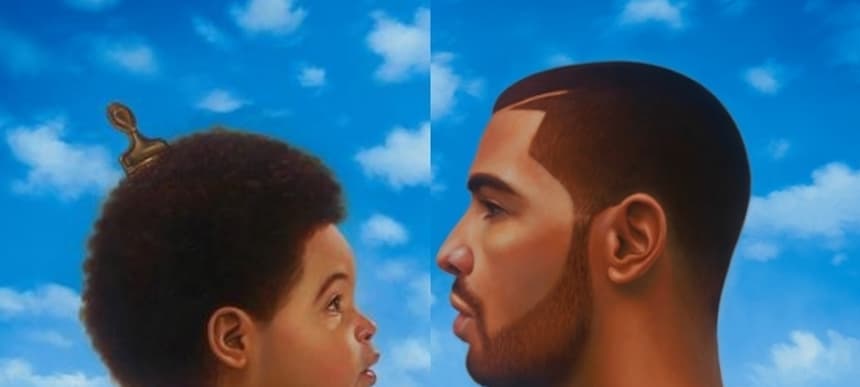
Album of the Week: Drake - 'Nothing Was the Same'
On his third studio album, following up 2011's 'Take Care' (which was, unabashedly, my album of that year) Aubrey Graham claims 'Nothing Was the Same'. His fans didn't need to even see the oil painted artwork, of a baby Graham face to face with a present day Graham, or even need to hear the tracks to know what this title meant for the subject matter of the record; the album would continue the familiar story of how fame – and becoming Drake – changed the Toronto rapper's life and relationships. In that sense, Everything Is the Same, and no Drake fan will find much to be surprised by on his newest LP.
Like two other notables who dropped bold, pop-challenging albums this year, though – Kanye West and Ciara – Drake seems to be attempting a zeitgeist-chameleon record with 'Nothing Was the Same', adopting a host of diverse sounds. Ushering in cutting edge producers like Hudson Mohawke (who has spent most of 2013 being cutting edge all over the biggest rap releases, including 'Yeezus' and Jay Z's 'Magna Carta Holy Grail') and nodding to genres as disparate as brawling rap and smooth night-riding synth pop, the album makes ambitious sonic leaps unlike anything Drake's attempted before, but without the sheer disregard for his listener's pleasure like West, or the seeming lack of a core identity like Ciara. In terms of production, nothing is the same from moment to moment; Connect – the HudMo-touched track – cracks the album open with delicious bass, From Time schmoozes the listener with delicate piano and headphone-loving guest vocals from Jhené Aiko, Worst Behaviour is a clattering, Atlanta-influenced party track and The Motion and Too Much burst with a looseness and freshness that suggest Sampha should have been allowed to co-produce the entire album.
Long-time collaborator Noah "40" Shebib's shadow hangs heavy as ever over this record, though, meaning that it never strays too far from the familiarly introspective, stomach-hitting Drake sound. What's more interesting than the variations in production, then, is Drake's new approach to song structure, which seems to hinge on either having no hooks on a song or having hooks that are repeated to such a queasy extent that they act more as bullish mantras than party-starters. There's definitely no YOLOs on this record – as the Toronto star declares on opener Tuscan Leather, "this is nothing for the radio". That track sprawls unapologetically over six minutes with no chorus to speak of, with Drake even questioning himself on how much time he's "spending on the intro", and making a sarcastic nod to his most radio-friendly track on 'Take Care' – The Motto – by ending the intro on a callback line, "real ni**a what's up." But take one listen to Started From The Bottom – a track that seems to begin and end with its titular sentiment – and the drunken, repetitive braggadocio of Worst Behaviour and he's exploring the opposite end of the spectrum, seeing how far he can push his audience with aggressively over-deployed hooks.
That callback line in Tuscan Leather isn't just a throwaway moment, either, but a symptom of a wider feeling of self-aggrandising and self-analysis that pervades the whole album. With an intertextuality that sees him lift lines, melodies and – most pressingly – themes from all of his previous work, Drake uses this album to build on the myth of Drake while at the same time under-cutting it with a more raw honesty than he's ever offered before. The best example of this is the explicit name-drop of ex-girlfriend Courtney in From Time; while he's always talked about his exes in his music, he takes this to its most cringe-worthy conclusion here by using his song as a direct means of communication with a woman he was once close to. It's as though the protagonist of Marvin's Room, drunkenly calling his ex-girlfriends from a lonely and lavish hotel room, wrote this song, or even this whole album, turning his music into an extended voicemail to people he feels he has unfinished business with (see: Too Much). The effect is an album that cements Drake as the cathartic, hyper-emotional rapper he's always acted as with a new sincerity, but comes off as a little over-eager in the process, losing some of that persona's charm for the sake of unflinching truth.
Overall this album has its moments of immensely enjoyable, incomparably self-aware and incisive hip hop (and synth pop), but it also has plenty of skippable tracks. 305 To My City is dull, Wu-Tang Forever is a damp tribute to its namesake and the only thing the limp Pound Cake will achieve is to send its audience to the fridge after being not-so-subliminally infected with the idea that they fancy some cake. 'Nothing Was the Same' contains some of the rapper's finest output – Hold On, We're Going Home and Too Much are surely two of the best tracks of the year – but it also has way more weak links than its predecessor. What's most disappointing about it is the discovery that without moments of reckless abandon and humourous detachment like HYFR, the rapper's usual fare isn't quite as easy to stomach. There's a sense that Drake has poured everything he can into this album, reaching the climax of a narrative arc he's been building throughout his career – the uneasy question it leaves is, where could he possibly go next?
7/10
Republic/Young Money/Cash Money/OVO Sound released 'Nothing Was the Same' on the 24th September.













